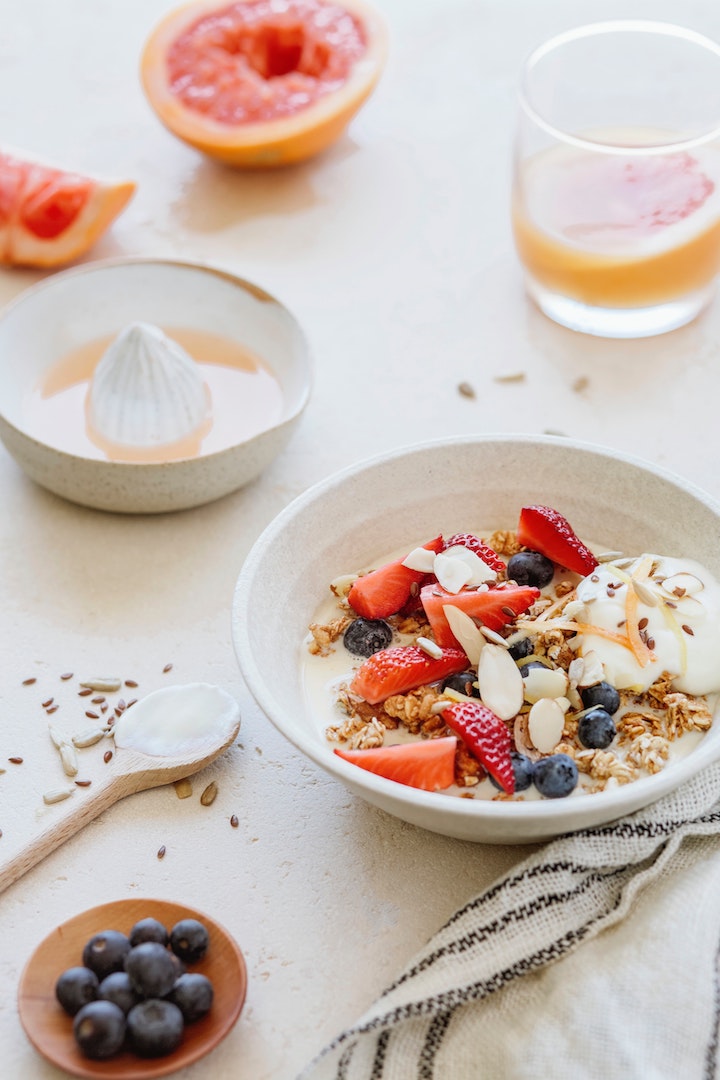Ideal for both the night owls and the early risers.
It has been shown time and again that most of us do not get enough sleep. The average person manages seven hours each night, which falls short of the recommended eight. According to The Sleep Council, 33% only catch 5-6 hours each night, while 7% get less than five. Yikes! The Global Wellness Summit’s 2020 Wellness Trends predicts that this year, the idea of ‘sleep hygiene’ will be huge, and largely focused on getting our circadian rhythm back in a groove.
So much work here can be done with your diet, with many foods providing our body with the tools it needs to sleep better. With this in mind, we’ve teamed up with the author of ‘The Art of Sleeping’, Rob Hobson, to bring you this advice on how to sleep better; our 5 diet tips on hacking your circadian rhythm with food, IDEAL for both the night owls and the early risers.
FUEL YOUR MORNINGS
Getting up, energised, and ready to take on the day can be just as challenging as going to sleep for some people, especially night owls. Avoid falling into the snooze button void and get up at the same time each day and fuel your morning with the right nutrition. Start the day with a nourishing breakfast rich in protein and fibre to keep you feeling full and energised all the way through ‘till lunch.
Rob recommends: “To get a healthy start to the day, make time for a nutritious breakfast such as plain yoghurt topped with fresh fruit and crushed almonds, the latter containing energising plant protein and healthy fats, plus fibre, to keep you going throughout the day. They are also a high source of magnesium, which contributes to the reduction of tiredness and fatigue. They’re a perfect feel good fuel to get you off to the right start.”
SAY NO TO A LONG SIESTA
Some of us can fall victim to ‘catching up on sleep’ at the weekends and enjoying a huge lie-in or going back to bed in the afternoon, but if you’re having trouble getting a good night’s sleep, powering through the day and avoiding the temptation to have a long afternoon doze is crucial to keeping your circadian rhythm in check.
A quick 40 winks is fine, but any longer and you’re at risk of suffering from sleep inertia – that groggy feeling you get when you wake up. If you feel yourself flagging during the day, try to keep yourself active and alert. Go for a short walk, stay hydrated and grab a nourishing snack instead.
Rob comments: “Research suggests that we’re more likely to crave foods high in fat, salt and sugar when we are tired, so it’s no wonder we’re grabbing the biscuit tin for a sweet fix when we hit that 3 pm slump at work. But this really doesn’t help us to stay sustained and focused in the long run. Instead, opt for a healthy snack like a handful of unsalted almonds and a banana.”
TIRING TRYPTOPHAN
Tryptophan is an amino acid found naturally in a number of foods. It plays a role in maintaining our circadian rhythm as it’s used by the body to make serotonin which in turn is converted to melatonin. Melatonin is the hormone that is released when it gets dark to help trigger our internal body clock into going to sleep, so it’s great to nurture this any way you can.
Rob recommends: “You can increase your intake of tryptophan by eating foods such as seeds, soya beans, bananas, chicken, turkey, oats, beans and eggs. Eating these foods with a source of carbohydrate can help with its uptake in the brain. So, a simple dish of scrambled eggs on toast or chicken stir fry with rice is a good choice for a quick and easy dinner.”
DON’T GO TO BED HUNGRY
Skipping evening meals, not eating enough or eating sugary foods before bed may cause dramatic shifts in blood glucose during the night, which in turn can stimulate the brain, signalling it to wake up and eat. This phenomenon can disrupt sleep and affect overall sleep quality.
Rob recommends: “Try to eat something before bedtime and keep it light to avoid any digestive issues that may also contribute to your ability to get to sleep. Evening snacks containing protein and good fats are a useful way to have a slow release of energy during the night, especially important if you have eaten early in the evening. Recent research has also shown that items containing these good fats represent a useful snack to curb hunger pangs.”
THE MAGIC OF MAGNESIUM
Other nutrients, such as magnesium, also have a role to play in sleep quality and relaxation. Among its many roles, magnesium is important for the normal functioning of the nervous system and psychological health, it is also involved in the production of the sleep hormone melatonin.
Rob says: “Magnesium is more rapidly depleted from the body during times of stress, and low levels are associated with anxiety and insomnia. Which can, in turn, create a vicious circle of depletion and anxiety, preventing you from sleeping well. Magnesium is difficult to absorb from food so to ensure you are getting enough in your diet (especially if you are under stress) you can increase your intake by including foods such as dark green leafy vegetables, nuts, seeds, beans, pulses and cocoa powder.”
Want to keep on hacking that sleep cycle of yours? Check out our 5 IDEAL steps to the perfect bedtime routine, and make sure you set that alarm for the morning!









